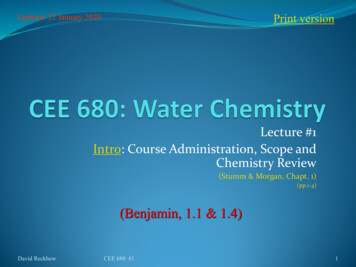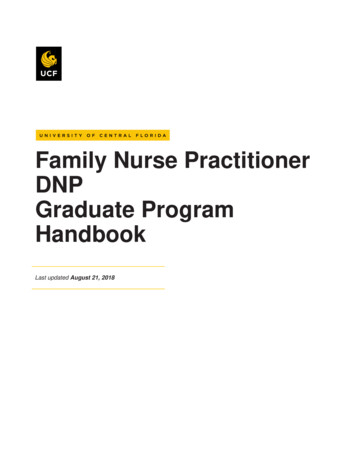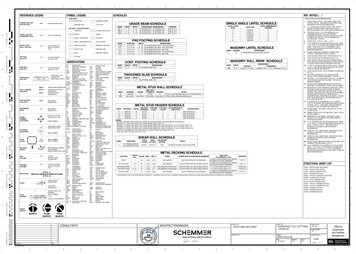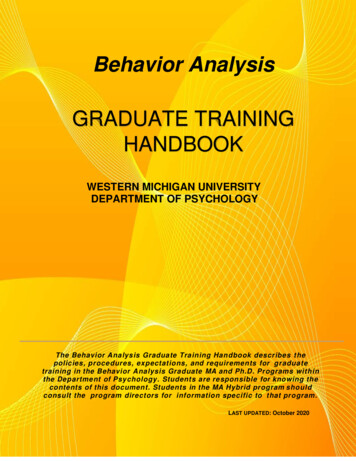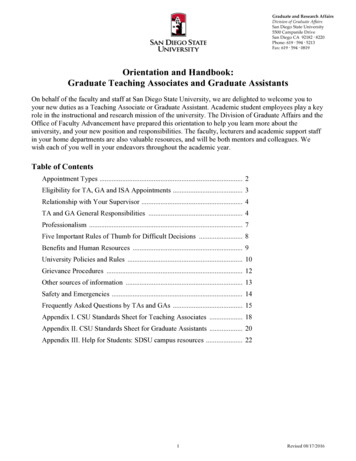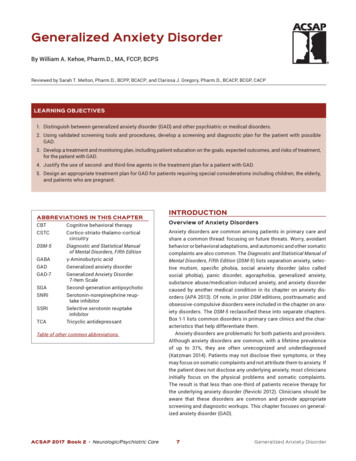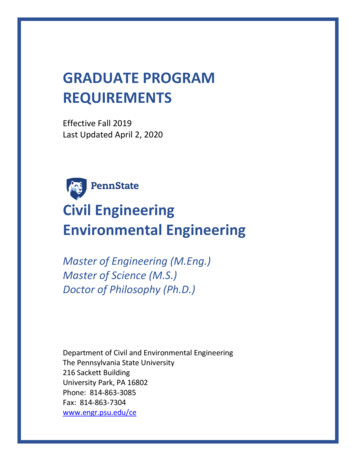
Transcription
GRADUATE PROGRAMREQUIREMENTSEffective Fall 2019Last Updated April 2, 2020Civil EngineeringEnvironmental EngineeringMaster of Engineering (M.Eng.)Master of Science (M.S.)Doctor of Philosophy (Ph.D.)Department of Civil and Environmental EngineeringThe Pennsylvania State University216 Sackett BuildingUniversity Park, PA 16802Phone: 814-863-3085Fax: 814-863-7304www.engr.psu.edu/ce
ContentsPART 1: INTRODUCTION . 3PROGRAM OVERVIEW . 3PROGRAM MISSION AND GOALS . 4DISTINCTIVE FEATURES AND PROGRAM EMPHASES. 4GRADUATE STUDIES AND RESEARCH . 4SUPPORT STAFF . 5FACULTY RESEARCH AREAS. 6PART 2: ADMISSION AND ENTRANCE REQUIREMENTS . 11ADMISSION REQUIREMENTS . 11ADMISSIONS ASSESSMENT CONSIDERATIONS . 12PART 3: ADMISSION TO PROGRAM AND INITIAL PROGRESSION . 15DEVELOPING A PLAN OF STUDY . 15STUDENT ACADEMIC SUPPORT . 15CHANGING ADVISORS . 16SUPPORT SERVICES . 16DEGREE DESCRIPTION AND CREDIT REQUIREMENTS . 18ADVISOR/ADVANCED DEGREE COURSE PLAN . 20CONTINUOUS REGISTRATION . 20PART 6: MASTER OF SCIENCE REQUIREMENTS . 22DEGREE DESCRIPTION AND CREDIT REQUIREMENTS . 22ACADEMIC ADVISOR/PLAN OF STUDY FORM . 24SELECTION OF THESIS SUPERVISOR . 26ADVISORY COMMITTEE/THESIS PROPOSAL . 26THESIS SUBMISSION REQUIREMENTS . 27PART 7: DOCTORAL REQUIREMENTS . 29DEGREE DESCRIPTION AND CREDIT REQUIREMENTS . 29QUALIFYING EXAMINATIONS . 31THESIS PROPOSAL AND COMPREHENSIVE EXAMINATION . 35CONTINUOUS REGISTRATION AND SATISFACTORY SCHOLARSHIP . 36CONDUCTING RESEARCH . 37WRITING AND DEFENDING THE DOCTORAL DISSERTATION . 37FINAL DISSERTATION DOCUMENT . 38GRADUATION . 392
PART 1: INTRODUCTIONPROGRAM OVERVIEWThe Penn State Civil and Environmental Engineering (CEE) Department, established in 1881, isinternationally recognized for excellence in the preparation of undergraduate and graduateengineers through the integration of education, research, and leadership. In 2017, the CivilEngineering undergraduate program was ranked 14th by U.S. News and World Report, thegraduate program in Civil Engineering was ranked 21st, and the graduate program inEnvironmental Engineering was ranked 24th. More than 400 juniors and seniors are enrolled inthe undergraduate program, and approximately 90 students are active in the graduate program,with about 60% pursuing doctoral degrees. Penn State is a large research university, and the CEEDepartment, with its 35 tenure track faculty members and full-time instructors, performs 15,000,000 of research annually. The Department’s faculty members have received prestigioushonors including NAE membership and 12 NSF CAREER awards.The CEE Department offers six graduate degrees: Master of Engineering (M.Eng.), Master ofScience (M.S.), and Doctor of Philosophy (Ph.D.) in either Civil Engineering or in EnvironmentalEngineering. Within Civil Engineering, research-oriented graduate students can specialize in oneof four areas: Geotechnical and Materials Engineering, Structural Engineering and Mechanics,Transportation Engineering, or Water Resources Engineering. Interdisciplinary programs can alsobe pursued, particularly at the doctoral level. Each of the graduate degrees requires the studentto meet specific requirements of both the Pennsylvania State University Graduate School and theCEE Department. This handbook describes the departmental programs and requirements. ForGraduate School degree requirements, students are advised to consult the Graduate Bulletin at:http://www.psu.edu/bulletins/whitebook. The most current Graduate School policies areprovided at ies/.Students should direct specific inquires with respect to the CEE graduate programs to:Professor-in-Charge of Graduate ProgramsDr. Shelley M. Stoffels208 Sackett BuildingUniversity Park, PA 16802814-865-7254sms26@psu.eduGraduate Staff AssistantMs. Christine Woytowich216 Sackett BuildingUniversity Park, PA 16802814-863-3085cxw17@psu.eduThis handbook is divided into seven parts. Part 1 discusses the CEE graduate program missionand goals, distinctive features of the program and program emphasis areas, graduate studies andresearch support staff, faculty and areas of study. Part 2 discusses developing a Plan of Study,Academic support, and advisor and student responsibilities. Part 3 describes the Graduate Schooldegree requirements. Parts 4, 5, and 6 describe the graduate degree requirements for each ofthe programs.3
PROGRAM MISSION AND GOALSThe mission of the Department of Civil and Environmental Engineering is to prepare students forprofessional practice, graduate study, lifelong learning, societal leadership and to improve thescientific and technological basis for civil and environmental engineering practice. To fulfill thismission, the Department seeks to provide a high quality undergraduate program with instructionin all fundamental areas of civil engineering, to conduct a distinguished program of research andgraduate study in selected areas of civil and environmental engineering, and to disseminateadvanced technical knowledge to engineers, other professionals, and the public.DISTINCTIVE FEATURES AND PROGRAM EMPHASESThe graduate programs at the Pennsylvania State University in Civil and EnvironmentalEngineering consist of Environmental Engineering, Geotechnical and Materials Engineering,Structural Engineering and Mechanics, Transportation Engineering, and Water ResourcesEngineering. Graduate enrollment over five years (2009-2014) has averaged 102 Master’sstudents and 109 Doctoral students. The research mission of the graduate program is supportedby state of the art facilities located at Civil Infrastructure Testing and Evaluation Laboratory(CITEL), the Kappe Environmental Engineering Laboratories, and the Larson TransportationInstitute (LTI) Test Track, in addition to other labs in Sackett and Hammond Buildings. Severalinstitutes and centers support research activities, particularly, the Larson Transportation Institute(LTI), the Penn State Institutes of Energy and the Environment (PSIEE), the Materials ResearchInstitute (MRI), and the Pennsylvania Housing Research Center (PHRC).GRADUATE STUDIES AND RESEARCHThe CEE Department offers graduate degrees in Civil Engineering and in EnvironmentalEngineering. The Master of Engineering (M.Eng.) degree is designed for students seeking anadvanced degree to enter professional practice. The M.Eng. degree is a coursework-only programthat students are required to start in the Fall semester and is designed for completion within oneyear. The M.Eng. degree requires a total of 31 credits of course work including the one-creditcolloquium, CE 590. The Master of Science (M.S.) degree is intended for students conductingresearch in a specialization area within CEE. The M.S. degree requires completion of 24 credits ofcoursework, a six-credit thesis, and the one-credit colloquium CE 590 (31 total credits). The M.S.degree (including the thesis) is designed for completion within two years. The Doctor ofPhilosophy (Ph.D.) degree is intended for students seeking in-depth knowledge in a specializationarea within CEE, and completing dissertation research at a level above that for an M.S. degree.Ph.D. graduates typically pursue faculty positions, research positions in industry, state, orgovernmental institutions.4
SUPPORT STAFFThe Graduate & Undergraduate Academic Programs Offices manage all Department of Civil andEnvironmental Engineering undergraduate programs, graduate programs, scholarships andfellowships, course and classroom scheduling, and web page administration. A computer systemstechnician and assistant provide IT support for the computer network and large number ofcomputers operated within the department. A laboratory supervisor and technician are availableto provide support for instruction and research in the departmental laboratories. Additionaltechnical staff provides support for research conducted at other research laboratories housedoutside the CEE Department. Additional staff support the departmental central office andresearch centers housed within the CEE Department.Table 1.1: Department of Civil and Environmental Engineering StaffLauren BrooksFinancial Assistantljd17@psu.edu212 Sackett BldgAmy BordasCITEL/Admin Support Asstajm114@psu.edu107 CITELTammy McCoyAdmin Support Assttxm814@psu.edu212 Sackett BldgTracy DormanPHRC/Meetings & Eventstsd5@psu.edu206B Sackett BldgRachel FawcettPHRC/Budgets & Pubsrjf5092@psu.edu206B Sackett BldgDavid FauldsLab Supervisordxf105@psu.edu8B Sackett BldgDan FuraCITEL/Lab Supervisordff10@psu.edu169-3 CITELBrenton Hockenberry UG Staff Assistantblh5621@psu.edu218 Sackett BldgMatt HassingerEngineering Aidehmh103@psu.edu5 Sackett BldgChristine WoytowichGraduate Staff Assistantcxw17@psu.edu216 Sackett BldgMichelle HillDept. Head Staff Assistantmvm3@psu.edu212 Sackett BldgChristopher HinePHRC/Housing & Land Devclh399@psu.edu206E Sackett BldgDavid JonesResearch Support Assistantdwj123@psu.edu125 Sackett BldgAllan KniselyIT Consultantahk11@psu.edu206K Sackett BldgAmy LongAdministrative Coordinatoralh9@psu.edu215A Sackett BldgSarah Klinetob-LowePHRC/Housing Systemssek175@psu.edu206D Sackett BldgTim SchleyCommunications Strategisttps5592@psu.edu219A Sackett BldgScott StringerIT Support Specialistbss12@psu.edu206H Sackett BldgHeather WeikelEnvironmental Staff Assthmw2@psu.edu206L Sackett Bldg.Brian WolfgangPHRC Associate Directorbmw5014@psu.edu 206C Sackett Bldg.5
FACULTY RESEARCH AREASEnvironmental Engineering (EnvE)The environmental engineering program includes faculty who specialize in the areas of acid minedrainage treatment, bioenergy production, bioremediation, ecological engineering,environmental microbiology, impacts of unconventional oil and gas development, renewableenergy production, sustainable environmental technologies, water chemistry, and water andwastewater treatment.Rachel A. Brennan, Associate Professor, 231K Sackett Bldg., rab44@psu.edu, 814-865-9428.Ecological wastewater treatment (Eco-MachinesTM); bioremediation of hazardous wastes,emerging contaminants, and acid mine drainage; beneficial reuse of aquatic biomass for theproduction of fertilizers, feedstocks, and biofuels; self-sustaining aquaponics.William D. Burgos, Professor, 115 Sackett Bldg., wdb3@psu.edu, 814-863-0578. Bioremediationof soil, sediment and groundwater; Biological metal oxidation in coal mine drainage; Biologicaliron (III) reduction; Biological uranium (VI) reduction; Environmental impacts of shale gasdevelopment.Fred S. Cannon, P.E., Professor, 225 Sackett Bldg., fsc1@psu.edu, 814-863-8754. Water, air, andhazardous waste treatment; activated carbon and surface chemistry.Christopher Gorski, Asssociate Professor, 231F Sackett Bldg., cag981@psu.edu, 814-865-5673.Contaminant fate in engineered and natural systems, aquatic geochemistry, environmental redoxchemistry.Li Li, Associate Professor, 221A Sackett Bldg., lxl35@psu.edu, 814-867-0151. Water qualitymodeling, watershed hydrogeochemistry, reactive transport, contaminant transport and fate.Bruce E. Logan, Kappe Professor, 231Q Sackett Bldg., bel3@psu.edu, 814-863-7908. Bioenergyproduction using exoelectrogenic microorganisms; renewable energy production using wasteheat and salinity gradient energy; environmental and chemical transport processes;bioremediation; and biological wastewater treatment.Wei Peng, Assistant Professor of International Affairs and Civil and Environmental Engineering,219B Sackett Bldg., wvp5117@psu.edu, 814-863-5304.John M. Regan, P.E., Professor, 220 Sackett Bldg., jmr41@psu.edu, 814-865-9436. Biologicalnutrient removal and transformations; conversion of organics into energy carriers throughbioelectrochemical systems, anaerobic digestion, and fermentative hydrogen production;molecular microbial ecology; biofilm systems.Nathaniel Warner, Assistant Professor, 231D Sackett Bldg., nrw6@psu.edu, 814-865-9423.Environmental impacts of unconventional oil and gas development, salinization of fresh waterresources, and application of geochemistry, including isotopes (Sr, B, Ra) to trace fluidinteraction, and treatment of oil and gas wastewater and solids.6
Geotechnical and Materials Engineering (GME)The geotechnical and materials engineering program focuses on a wide variety of topics fordevelopment and use of soil and construction materials. Areas for geotechnical engineeringinclude foundations, landslides, retaining walls, soil-structure interaction, geosynthetics, geoenvironmental, groundwater flow and transport, subsidence, soil dynamics and earthquakeengineering. Areas for materials engineering include a wide range of concrete-related researchtopics, including durability and sustainability of concrete infrastructure, novel high performancecementitious materials, and non-destructive evaluation of civil infrastructure. Pavementengineering emphasizes advanced modeling and testing of transportation materials,bituminous material characterization, pavement design and management, accelerated and fullscale pavement testing, and pavement construction and rehabilitation.Patrick J. Fox, P.E., Department Head and Shaw Professor, 212 Sackett Bldg., pjf14@psu.edu,814-863-3084. Geotechnical and geo-environmental engineering, subsidence, landfills,groundwater, slope stability, retaining walls, soil dynamics and earthquake engineering.Tong Qiu, P.E., Associate Professor, 116 Sackett Bldg., tuq1@psu.edu, 814-863-7305.Geotechnical engineering, soil dynamics, flow through porous media, fluid-solid interaction,landslides, and numerical methods in geotechnical engineering.Aleksandra Radlińska, Associate Professor, 231D Sackett Bldg., azr172@psu.edu, 814-865-9427.Cement and concrete in sustainable design, alternative binders, construction materials withreduced CO2 emission, durability, shrinkage, cracking of concrete, reliability-based analysis of thebehavior of construction materials.Farshad Rajabipour, Associate Professor, 231M Sackett Bldg., fxr10@psu.edu, 814-863-0601.Concrete materials, durability, alkali-silica reaction, green cements and concretes, novelpozzolans, beneficial use of coal combustion products.Mansour Solaimanian, Research Professor and Director of the Northeast Center for Excellencein Pavement Technology (NECEPT), 201 Transportation Research Building, mus1@psu.edu, 814863-1903. Bituminous materials including recycled and new materials in pavements.Shelley M. Stoffels, P.E., Professor, 208 Sackett Bldg., sms26@psu.edu, 814-865-7254. Pavementdesign and rehabilitation, infrastructure asset management, geotechnical engineering,engineering economics, professional practice issues.Ming Xiao, P.E., Associate Professor, 231P Sackett Bldg., mxz102@psu.edu, 814-867-0044.Seepage and erosion, particle transport and multi-phase flow and distribution in porous media,microscopic soil and pore fluid behaviors under in-situ and physicochemically and biologicallytreated conditions, performance of earth structures for in-service conditions and extreme events,innovative and recycled materials and their engineering applications.7
Structural Engineering and Mechanics (SEM)Faculty in the structural engineering and mechanics graduate program offer courses in structuralmechanics, and analysis and design of structures. The faculty is engaged in research in severalfields, including reinforced and prestressed concrete structures, steel structures, bridgeengineering, nondestructive bridge evaluation, protective systems, earthquake engineering,structural dynamics, performance based design, structural reliability, building envelope systems,building science and energy efficiency, structural control and health monitoring, multi-hazard riskassessment and mitigation, probabilistic mechanics, solid mechanics, computational mechanics,extreme events modeling and mitigation, inverse methods and optimization, and advancedmaterials applications.Pinlei Chen, Assistant Professor, 215C Sackett Bldg., pzc216@psu.edu, 814-863-4026. Interfacialconstitutive models for additive manufacturing; interface debonding and damage modeling;multiphysics thermo-mechanical coupled problems.Michael Hillman, L. Robert and Mary L. Kimball Assistant Professor, 224A Sackett Bldg.,mzh226@psu.edu, 814-863-0623. Computational mechanics; accelerated numerical methods;modeling of extreme events.Jeffrey A. Laman, P.E., Professor, 231J Sackett Bldg., jal17@psu.edu, 814-863-0523. Bridgeevaluation; bridge vehicle load modeling; testing and dynamics; long-term structural monitoring;fatigue; structural reliability methods; steel design.Ali Memari, Professor, Hankin Chair of Residential Construction and Director of PennsylvaniaHousing Research Center (PHRC), 222 Sackett Bldg., amm7@psu.edu, 814-863-9788. Safety andserviceability of residential building systems and components; full-scale mockup testing andevaluation of building envelope systems under natural hazard and environmental loadingconditions; experimental and analytical evaluation of light-frame, masonry; and panelized wallsystems for commercial and residential buildings.Kostas Papakonstantinou, Assistant Professor, 213C Sackett Bldg., kup31@psu.edu, 814-8634010. Stochastic mechanics; risk assessment and management; inverse methods andoptimization; structural health monitoring; earthquake engineering and structural dynamics;structural reliability; concrete durability.Gordon Warn, Associate Professor, 226B Sackett Bldg., gpw1@psu.edu , 814-863-2786.Structural dynamics; analytical modeling of resilience, earthquake engineering, seismicprotective systems.8
Transportation Engineering (TE)The transportation engineering program covers the areas of transportation planning, design, andoperations. Research areas include traffic operations, systems planning for freight, transit andnon-motorized travel, travel behavior, transportation planning for emergency response andclimate change related issues, infrastructure financing and programming, transportation safety,highway design and performance measures, intelligent transportation systems, human factorsand driver behavior, pavement marking materials, statistical and econometric analysis oftransportation systems, environmental and ecological aspects of transportation network design,and urban simulation.Eric T. Donnell, Professor, 231N Sackett Bldg., etd104@psu.edu, 814-863-7053. Highwaygeometric design; speed management; traffic safety.Vikash Gayah, Assistant Professor, 231L Sackett Bldg., vvg104@psu.edu, 814-865-4014. Trafficoperations; transportation network modeling; public transportation systems; urban mobility;traffic safety.Ilgin Guler, Assistant Professor, 221B Sackett Bldg., sig123@psu.edu, 814-867-6210. Multi-modalurban transportation; public transportation; traffic operations; infrastructure management;statistical modeling.Rajesh Paleti, Assistant Professor, 226A Sackett Bldg., rzp303@psu.edu, 814-863-4291. Discretechoice modeling and applied econometrics; travel demand modeling and forecasting; travelbehavior analysis; transportation safety; survey design and analysis; machine learning.Martin T. Pietrucha, P.E., Professor, 221 Sackett Bldg., mtp5@psu.edu, 814-863-7306. Highwaysafety; operational effects of highway geometrics; alternative transportation strategies.9
Water Resources Engineering (WRE)Water Resources Engineering faculty work in the areas of hydraulics, hydrology, water resourcemanagement, fluid mechanics, and wave mechanics. Research areas include watershedmanagement, river hydraulics, climate and environmental change impacts on water security,hydroinformatics, hydrologic modeling, uncertainty and reliability, and fundamental aspects ofwave mechanics.Caitlin Grady, Assistant Professor, 226C Sackett Bldg., cgrady@psu.edu, Monitoring andevaluation of international development projects, international environmental treaties, waterresources sustainability, network analysis, the food, water, energy nexus.Xiaofeng Liu, Assistant Professor, 223B Sackett Bldg., xliu@engr.psu.edu, 814-8632940. Computational fluid dynamics (CFD), environmental fluid mechanics, sediment transportand erosion control, land surface process and morphodynamics, multiphase flow, water qualitymodeling.Lauren McPhillips, Assistant Professor, 226B Sackett Bldg., lxm500@psu.edu, 814-865-4564.Water quality; stormwater management; green infrastructure; urban ecohydrology;biogeochemistry.Alfonso Mejia, Assistant Professor, 215B Sackett Bldg., amejia@engr.psu.edu, 814-865-0639.Hydrometeorology, urban hydrology, eco-hydrology, hydro-geomorphology, and watersustainability.Cibin Raj, Assistant Professor of Agricultural and Biological Engineering, 319 Forest ResourcesLaboratory, 814-865-7792, czr58@psu.edu. Storm water management; watershed modeling;application of optimization tools in watershed analysis; ecohydrological impacts of climate andland use change.Chaopeng Shen, Assistant Professor, 206C Sackett Bldg., cshen@engr.psu.edu, 814-863-5844.Large scale hydrology, computational hydrology, land surface processes, water-carbon-nutrientinteractions under global change, scale issues, subsurface reactive transport modeling, highperformance computing.10
PART 2: ADMISSION AND ENTRANCE REQUIREMENTSADMISSION REQUIREMENTSFor any graduate degree offered by the Department of Civil and Environmental Engineering,applicants should possess a baccalaureate degree in engineering from a regionally accreditedinstitution. Students without a baccalaureate degree in engineering may be admitted on aprovisional basis pending successful completion of entrance requirements (completedconcurrently with degree requirements and listed below). Students in engineering, physicalsciences, or mathematics with a 3.00 grade-point average (on a 4.00 scale) may be consideredfor admission. Exceptions to the minimum 3.00 grade-point average may be made for studentswith special backgrounds, abilities, and interests.U.S. applicants will upload unofficial copies of their transcripts, a statement of objectives, andthree references for letters of recommendation when applying to the program. If admitted,applicants will be required to provide the Graduate School with OFFICIAL transcripts of all theirprevious course work (in duplicate). In addition, all applicants must submit scores from theGeneral Graduate Record Examinations (GRE) Aptitude Test (verbal, quantitative, and analytical).For the M.Eng. degree, the GRE requirement will be waived for students who have graduatedwith a degree from the College of Engineering at Penn State with a cumulative grade-pointaverage of greater than 3.30.International applicants will upload unofficial copies of their transcripts, a statement ofobjectives, and three references for letters of recommendation when applying to the program.If admitted, applicants will be required to provide the Graduate School with official transcripts(or attested copies), degree, and diploma certificates in both English and native language.Photocopies will NOT be accepted. All international applicants whose native language is notEnglish must submit scores for the TOEFL (Test of English as a Foreign Language) or the IELTS(International English Language Testing System). The minimum acceptable score for the TOEFL is550 for the paper-based test, or a total score of 80 with a 19 on the speaking section for theInternet-based test (iBT). Applicants with iBT speaking scores between 15 and 18 may beconsidered for provisional admission, which requires completion of specified remedial Englishcourses ESL 114G (American Oral English for Academic Purposes) and/or ESL 116G(ESL/Composition for Academic Disciplines) and attainment of a grade of B or higher. Theminimum composite score for the IELTS is 6.5 on all subjects. International applicants who havereceived a baccalaureate or master’s degree from a college, university, or institution in any of thefollowing countries are exempt from the TOEFL requirement: Australia, Belize, British Caribbeanand British West Indies, Canada (except Quebec), England, Guyana, Republic of Ireland, Liberia,New Zealand, Northern Ireland, Scotland, the United States, or Wales.Additional details about the Graduate School requirements for applications and admissions areprovided at graduate-admission/.11
CHANGE OF DEGREEOccasionally, a graduate student who has been admitted for an academic degree program maywish to change to another CEE program (i.e., from M.S. to Ph.D.). In that case, the student should: discuss with their advisor,contact the CEE Graduate Programs office, andcomplete a “Resume Study/Change of Degree or Major” form and submit the request tothe Office of Graduate Enrollment Services for approval.Requests to change degree program are reviewed by department faculty in a similar manner asnew applications, but with additional emphasis placed on performance in their current program.M.ENG. and M.S. ENTRANCE REQUIREMENTSStudents without a baccalaureate degree in engineering must successfully complete entrancerequirements (completed prior to or concurrently with degree requirements) that are unique foreach area of specialization (Tables 2.1 to 2.4). Students must take all entrance requirements onan A/F basis and earn a B or better. Students may petition to use other related courses to satisfythese requirements or substitute relevant work experience. Students are encouraged to meetwith their academic advisor to discuss these requirements or to contact the department prior toapplication.PH.D. ENTRANCE REQUIREMENTSPh.D. applicants who begin their program after completion of a CE or EnvE Master’s degree(M.Eng. or M.S.) have typically previously met all entrance requirements as well as the corecourse requirements for their specialization area (detailed in Tables 6.1 to 6.5). Exceptionalapplicants are encouraged to apply for Direct Entry into the Ph.D. program (i.e. entering theprogram without first completing a Master’s degree). In that case, the core course requirements(Tables 6.1 to 6.5) will be integrated into the PhD program plan of study, or the student maycomplete an M.S. “along the way” to the PhD. Direct PhD students must also meet the entrancerequirements in Tables 2.1 to 2.4.ADMISSIONS ASSESSMENT CONSIDERATIONSThe Pennsylvania State University is committed to an equal access policy for all persons, assuringequal access to programs, facilities, admission, and employment without regard to personalcharacteristics not related to ability, performance, or qualifications as determined by Universitypolicy or by state or federal authorities. It is the policy of the University to maintain an academicand work environment free of discrimination, including harassment. The Pennsylvania StateUniversity prohibits discrimination and harassment against any person because of age, ancestry,color, disability or handicap, national origin, race, religious creed, sex, sexual orientation, orveteran status. Direct all inquiries regarding the nondiscrimination policy to: Affirmative ActionOffice, 328 Boucke, University Park, PA 16801; Phone 814-863-0471; email aao@psu.edu.12
Table 2.1. Entrance requirements for students without a B.S. engineering degree applying for theM.Eng. (Infr
The graduate programs at the Pennsylvania State University in Civil and Environmental Engineering consist of Environmental Engineering, Geotechnical and Materials Engineering, Structural Engineering and Mechanics, Transportation Engineering, and Water Resources Engineering. Graduate enrollment over five years (2009-2014) has averaged 102 Master's
